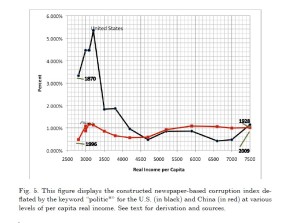Does China have a corruption problem?
In the paper I’m highlighting this week, from Mr. Carlos D. Ramirez of the Department of Economics at the George Mason University, the conclusion is; er, not really.
What’s especially interesting about this work is that was published in December 2012 some time before Mr. Xi went in determined search of his Tigers and Flies.
This chart extracted from the paper shows, the black line, U.S. corruption (as measured by newspaper articles referring to same) from 1870 to 1928. The red line is China in the period 1996 to 2009. Over these time periods real per capita income went for both from around U$2,800 to U$7,800.
A side from noting China achieved the same income growth in a little over ten years the U.S. took nearly fifty to attain what’s striking is how much worse corruption was in the U.S. at the beginning of the period.
side from noting China achieved the same income growth in a little over ten years the U.S. took nearly fifty to attain what’s striking is how much worse corruption was in the U.S. at the beginning of the period.
Moreover, as Mr. Ramirez points out, there’s reason to believe the situation is even better in China than his analysis suggests. Why? His corruption index for China is built from an analysis of stories in U.S. newspapers and he notes, as other academic studies have done, U.S. newspapers give more coverage to corruption in China than any other country.
So the bottom line is yes, China had a corruption problem; but only consistent with another major economy at the same stage of income development (I suspect this analysis would also work with a look at Korea and/or Japan over the same wealth growth trajectory?). However, as far back as 2012 it was clear it had, to a very large extent, self corrected. It’s also likely the trend was continuing to improve and less bad than china-bashing commentators in the U.S. media were then (and still are) making out.
This analysis then raises a slightly sinister question (from me not Mr. Ramirez); if corruption in China was merely conforming to a regularly observed historical inverted-U trend and largely in the process of self correction by 2012 what’s really motivated Mr. Xi’s current campaign? Additionally, is the intensity Mr. Xi and his agents are applying appropriate and will the economic consequences be worth it?
As those are broadly political questions I’ll pass on further speculation. Chinese politics, for me at least, is a subject that used to be marked on old maps ‘There Be Dragons Here!’ and best avoided whenever possible. Like today.
The full paper, an easy read mercifully short of wonk-tastic math, can be accessed via the following link http://ssrn.com/abstract=2185166
Happy Sunday